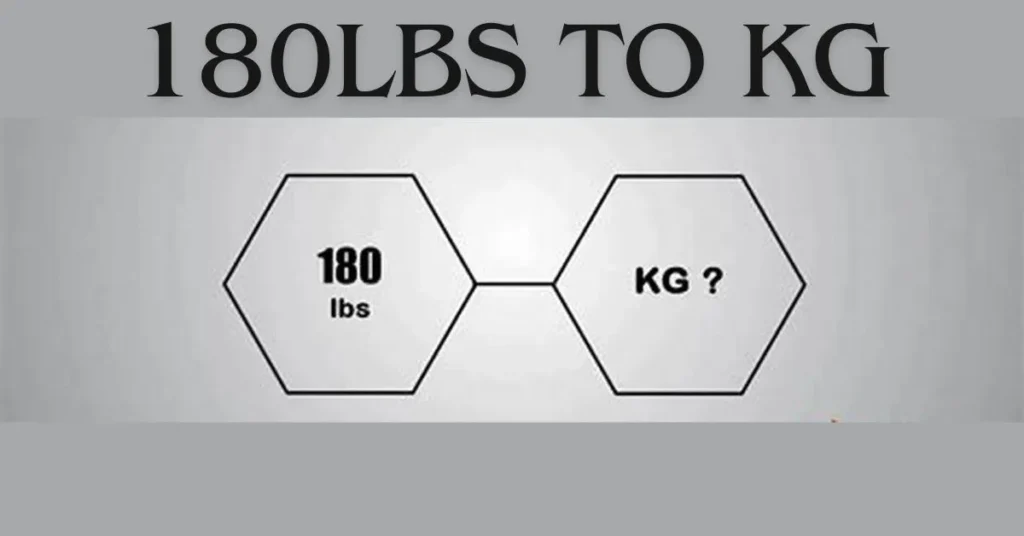Are you puzzled about converting weights from pounds to kilograms? You’re not alone! Whether you’re tracking your fitness goals, planning for travel, or just curious, knowing how to convert weights is super handy. If you’ve ever wondered, “How do I convert 180lbs to kg?” you’re in the right place. Let’s dive into the world of weight conversion in a way that’s easy to understand and fun to learn.
Why Convert Pounds to Kilograms?
Before we get into the nitty-gritty of converting 180lbs to kg, let’s talk about why you might need to make this conversion in the first place. Different countries use different measurement systems. In the United States, pounds (lbs) are commonly used to measure weight. However, most of the world uses the metric system, where weight is measured in kilograms (kg).
This difference can be confusing, especially when you’re dealing with health and fitness data, shipping weights, or even cooking recipes. By learning how to convert pounds to kilograms, you can easily switch between the two systems and ensure you have accurate information no matter where you are or what you’re doing.
The Simple Math Behind 180lbs to kg:
Converting 180lbs to kg is easier than you might think. The basic formula you need to know is:
1 pound (lb) = 0.45359237 kilograms (kg)\text{1 pound (lb) = 0.45359237 kilograms (kg)}
Using this conversion factor, you can multiply the number of pounds by 0.45359237 to get the equivalent weight in kilograms. Let’s break it down:
180 lbs×0.45359237=81.6466266 kg180 \, \text{lbs} \times 0.45359237 = 81.6466266 \, \text{kg}
So, when you convert 180lbs to kg, you get approximately 81.65 kg. Simple, right?
Why Accuracy Matters in Weight Conversion:
You might be wondering, “Why not just round off the numbers?” While rounding can be useful for quick estimates, accuracy is crucial in many situations. For example, athletes and fitness enthusiasts often need precise measurements to track their progress. Even small differences in weight can affect performance and health outcomes.
Similarly, in scientific research and medical fields, precise measurements are essential. Incorrect data can lead to errors in experiments, diagnoses, and treatments. That’s why understanding the exact conversion from 180lbs to kg can be important beyond just casual curiosity.
Practical Applications of Converting 180lbs to kg:
Now that you know how to convert 180lbs to kg, let’s explore some practical applications. Whether you’re an athlete, a traveler, or a student, this knowledge can be incredibly useful in everyday life.
Fitness and Health:
If you’re working on your fitness goals, you might track your weight regularly. Gyms and fitness programs often use kilograms for weight measurements. Knowing that 180lbs is approximately 81.65kg can help you better understand your progress and set realistic goals.
Traveling Abroad:
Traveling to a country that uses the metric system? Understanding weight conversions can help you manage your luggage. Airlines often specify baggage limits in kilograms. Knowing how to convert 180lbs to kg can ensure you pack within the limits and avoid extra fees.
Educational Purposes:
For students studying science or medicine, converting weights between pounds and kilograms is a fundamental skill. Many textbooks and research papers use the metric system. Being able to convert 180lbs to kg helps in understanding and applying this knowledge accurately.
How to Use Online Tools for Conversion:
While it’s great to know the math behind the conversion, sometimes you need a quick answer. That’s where online tools come in handy. A simple search for “180lbs to kg” on your favorite search engine will give you instant results.
There are also many dedicated conversion websites and mobile apps that can help. These tools are especially useful when you’re in a hurry or need to convert multiple weights quickly. They ensure accuracy and save you time.
Fun Facts About Pounds and Kilograms:
Let’s take a little detour and explore some fun facts about pounds and kilograms. Understanding the history and usage of these units can give you a deeper appreciation for why we use them.
The Origin of Pounds:
The pound is a unit of weight that dates back to ancient Rome. The Roman libra (hence the abbreviation “lb”) was roughly equivalent to 327 grams. Over time, the pound evolved and standardized to the 453.59237 grams we use today.
The Metric System and Kilograms:
The kilogram is part of the metric system, which was developed in France during the late 18th century. The metric system was designed to be universal and easy to use, based on the decimal system. The kilogram is defined as the mass of one liter of water.
Global Usage:
While the United States primarily uses pounds, most other countries have adopted the metric system. This global standardization helps in international trade, travel, and scientific research, making conversions like 180lbs to kg essential for global communication.
Common Conversion Mistakes to Avoid:
Converting weights might seem straightforward, but there are common mistakes people make. Being aware of these can help you avoid errors.
Using Incorrect Conversion Factors:
Always use the correct conversion factor. Remember, 1 pound equals 0.45359237 kilograms. Using an incorrect factor can lead to significant inaccuracies, especially with larger weights.
Rounding Errors:
While it’s okay to round numbers for casual conversations, avoid excessive rounding when precision is required. For instance, converting 180lbs to kg should give you 81.65 kg, not just 81 kg.
Confusing Mass and Weight:
In physics, mass and weight are different concepts. Mass is the amount of matter in an object, while weight is the force exerted by gravity on that object. However, in everyday language, we often use “weight” to mean “mass.” Just be aware of this distinction when dealing with scientific data.
Making Weight Conversion a Habit:
Once you understand how to convert 180lbs to kg, you can make weight conversion a regular part of your routine. This is especially useful if you frequently work with weights in different units. Here are some tips to help you:
Practice Regularly:
Like any skill, regular practice helps. Try converting different weights whenever you encounter them. The more you practice, the quicker and more accurate you’ll become.
Use Conversion Charts:
Keep a conversion chart handy. Whether you print one out or save it on your phone, a chart can be a quick reference guide. This is particularly useful when you don’t have access to the internet.
Teach Others:
Teaching is a great way to reinforce your own knowledge. Explain the conversion process to friends, family, or colleagues. Helping others understand weight conversion will solidify your understanding and make you more confident in your skills.
The Importance of Unit Consistency:
When dealing with weights, it’s essential to maintain consistency in your units. Mixing pounds and kilograms without proper conversion can lead to confusion and errors. Whether you’re cooking, shipping, or exercising, stick to one unit of measurement or ensure accurate conversions.
Cooking and Baking:
Recipes often specify ingredient weights. If you’re following a recipe that uses pounds, converting to kilograms can ensure accuracy, especially in baking where precision matters. Knowing that 180lbs to kg is 81.65 kg can help you adjust recipes accurately.
Shipping and Logistics:
In shipping, weights are crucial for calculating costs and logistics. Ensuring you use the correct units can prevent misunderstandings and additional fees. If your shipment is listed in pounds, converting it to kilograms accurately will help in international shipping processes.
Exercise and Fitness:
In fitness, consistency in weight measurements helps track progress accurately. Whether you’re lifting weights or monitoring body weight, using consistent units ensures your data is reliable and meaningful. Converting 180lbs to kg gives you a clear understanding of your weight in the metric system.
Converting Back: From Kilograms to Pounds:
Just as you might need to convert pounds to kilograms, sometimes you’ll need to go the other way. The process is just as simple. The basic formula to convert kilograms to pounds is:
1 kilogram (kg) = 2.20462 pounds (lbs)\text{1 kilogram (kg) = 2.20462 pounds (lbs)}
So, if you need to convert 81.65 kg back to pounds, you would multiply:
81.65 kg×2.20462=180 lbs81.65 \, \text{kg} \times 2.20462 = 180 \, \text{lbs}
This shows the conversion is accurate and reversible, making it easy to switch between units as needed.
The Role of Technology in Weight Conversion:
In today’s digital age, technology plays a significant role in simplifying weight conversions. From smart scales to conversion apps, technology ensures accuracy and convenience.
Smart Scales:
Many modern scales offer the ability to switch between pounds and kilograms. These scales are perfect for those who need regular and accurate weight measurements. Simply set your preferred unit, and the scale will do the conversion for you.
Mobile Apps:
Numerous mobile apps can convert weights instantly. These apps are handy tools for quick conversions on the go. Simply enter the weight in pounds, and the app will provide the equivalent in kilograms, and vice versa.
Online Calculators:
Online calculators are another excellent resource. A quick search for “180lbs to kg” will provide you with instant results. These calculators are reliable and user-friendly, making weight conversion a breeze.
Embracing the Metric System:
While the imperial system is prevalent in the United States, the metric system’s simplicity and universality make it worth embracing. Understanding conversions like 180lbs to kg helps bridge the gap between these systems.
Education and Awareness:
Education plays a crucial role in promoting metric system usage. Schools and educational programs that teach both systems prepare students for a globalized world. Encouraging the understanding and use of kilograms alongside pounds can ease transitions and enhance comprehension.
Practical Benefits:
The metric system’s base-10 structure simplifies calculations and conversions. Whether you’re measuring weights, distances, or volumes, the metric system’s straightforward approach reduces errors and enhances efficiency.
Conclusion: Mastering the Art of Weight Conversion
Converting 180lbs to kg is more than just a mathematical exercise; it’s a valuable skill that applies to many aspects of daily life. From fitness and travel to education and cooking, understanding how to switch between pounds and kilograms ensures accuracy and clarity.
Remember, the key conversion factor is 1 pound equals 0.45359237 kilograms. Using this factor, you can confidently convert any weight from pounds to kilograms and back. Practice regularly, use available tools, and embrace the metric system to enhance your weight conversion skills.
So, the next time you encounter a weight measurement, you’ll know exactly how to handle it. Whether you’re converting 180lbs to kg or explaining the process to a friend, you’re now equipped with the knowledge and confidence to make accurate conversions. Enjoy the ease and precision that comes with mastering weight conversion!







